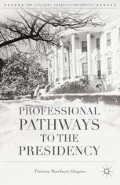Abstract
The Statue of Liberty has stood on Ellis Island since 1886 as the “Mother of Exiles,” welcoming immigrants to the shores of a land of promise. Huddled masses have come to the United States in pursuit of her promise of freedom. Sometimes they have been in search of political freedom; sometimes, religious freedom; sometimes, economic. My ancestors came for religious freedom, but in finding that, they also found land to farm. Initially, with the help of their neighbors, they built their own home on that land; later they were able to move to the city and buy a home. Their children were able to attend free public schools; their grandchildren, affordable colleges. Through the generations they realized the American Dream, a dream that prophesied that, no matter how humble their beginnings, if they worked hard, they would prosper. Because, in America, those who are determined can achieve anything. In America, anyone can grow up to be president.
Access this chapter
Tax calculation will be finalised at checkout
Purchases are for personal use only
Preview
Unable to display preview. Download preview PDF.
Notes
Adlai E. Stevenson, Quotations Book, 2007, http://quotationsbook.com/quote/31121/#sthash.jQ9Z50JA.dpbs (accessed July 5, 2013).
Napoleon Bonaparte, Think Exist, 1999–2013, http://thinkexist.com/quotation/the_heart_of_a_statesman_must_be_in_his_head/148800.html (accessed July 5, 2013).
Max Weber, “The Three Types of Legitimate Rule,” Berkeley Publications in Society and Institutions 4 (1958): 1–11.
Martin E. Spencer, “Weber on Legitimate Norms and Authority,” British Journal of Sociology 21 (1970): 123–34.
Max Weber, Economy and Society: An Outline of Interpretive Sociology, eds. Guenther Roth and Claus Wittich, vol. 2 (New York; Bedminster Press, 1968), 650–78.
John Jay, “Federalist 64,” in The Federalist Papers, eds. Alexander Hamilton, James Madison, and John Jay (New York: New American Library, 1961), 391.
Wayne Shannon, as quoted in Karlyn Bowman, “Do You Want to Be President?” The Public Perspective 8 (1997): 39.
Max Weber, “Politics as a Vocation,” From Max Weber: Essays in Sociology, ed. and trans. H. H. Gerth and C. Wright Mills (New York: Oxford University Press, 1958), 79.
Peter M. Blau, “Critical Remarks on Weber’s Theory of Authority,” American Political Science Review 57 (1963): 305–16.
Martin Riesebrodt, “Charisma in Max Weber’s Sociology of Religion,” Religion 29 (1999): 1–14.
Joseph M. Marshall, Walking with Grandfather: The Wisdom of Lakota Elders (Boulder, CO: Sounds True, 2005), 1–2.
Steven C. Koven, “The Bureaucracy-Democracy Conundrum: A Contemporary Inquiry into the Labyrinth,” in Handbook of Bureaucracy, ed. Ali Farazmand (New York: Marcel Dekker, 1994), 79–96.
Jeffrey Edward Green, “Max Weber and the Reinvention of Popular Power,” Max Weber Studies 8 (2008): 209.
James David Barber, The Presidential Character: Predicting Performance in the White House (Englewood Cliffs, NJ: Prentice Hall, 1972).
Richard E. Neustadt, Presidential Power (New York: New American Library, 1960).
Richard M. Pious, Why Presidents Fail (Lanham, MD: Rowman and Littlefield, 2008).
Arthur M. Schlesinger, Jr, “Rating the Presidents: Washington to Clinton,” Political Science Quarterly 112 (1997): 179–90.
Thomas Andrew Bailey, Presidential Greatness (New York: Appleton-Century, 1966).
David L. Porter, “American Historians Rate Our Presidents,” in The Rating Game in American Politics: An Interdisciplinary Approach, eds. William D. Pederson and Ann M. McLaurin (New York: Irvington Publishers, 1987), 13–37.
Robert K. Murray and Tim H. Blessing, Greatness in the White House: Rating the Presidents, from Washington through Ronald Reagan (University Park, PA: Pennsylvania State Univ. Press, 1994).
Joseph E. Uscinski and Arthur Simon, “Partisanship as a Source of Presidential Rankings,” White House Studies 11 (2011): 1–14.
Tim H. Blessing, Anne Skleder, and Di You, “The Effects of Partisanship and Ideology on Expert Raters’ Evaluations of Presidents Carter, Reagan, Bush 41, Clinton and Bush 43,” White House Studies 11 (2011): 189–212.
Meena Bose, “Presidential Ratings: Lessons and Liabilities,” in The Uses and Abuses of Presidential Ratings, eds. Meena Bose and Mark Landis (Hauppauge, NY: Nova Science Publishers, 2003), 1–23.
Robert W. Merry, Where They Stand (New York: Simon and Schuster, 2012), 18–19.
Alvin Stephen Felzenberg, The Leaders We Deserved (and a Few We Didn’t): Rethinking the Presidential Rating Game (New York: Nova Publishers, 2003), 75.
C-SPAN, C-SPAN 2009 Historians Presidential Leadership Survey, http://legacy.c-span.org/PresidentialSurvey/Overall-Ranking.aspx (accessed July 12, 2013).
Arthur M. Simon, and Joseph E. Uscinski, “Prior Experience Predicts Presidential Performance,” Presidential Studies Quarterly 42 (2012): 514–48.
John Balz, “Ready to Lead on Day One: Predicting Presidential Greatness from Political Experience,” PS: Political Science & Politics 43 (2010): 487–92.
Jack E. Holmes and Robert E. Elder, Jr, “Our Best and Worst Presidents: Some Possible Reasons for Perceived Performance,” Presidential Studies Quarterly 19 (1989): 529–57.
Dean Keith Simonton, Why Presidents Succeed: A Political Psychology of Leadership (New Haven: Yale University Press, 1987), 188.
Merle Miller, Lyndon: Oral Biography (New York: Ballantine Books, 1987), 344.
William A. DeGregorio, The Complete Book of U. S. Presidents (Fort Lee, NJ: Barricade Books, 2009).
Joseph Nathan Kane and Janet Podell, Facts about the Presidents: From George Washington to Barack Obama (New York: H. W. Wilson Company, 2009).
Copyright information
© 2015 Theresa Marchant-Shapiro
About this chapter
Cite this chapter
Marchant-Shapiro, T. (2015). Preparing for Greatness. In: Professional Pathways to the Presidency. The Evolving American Presidency Series. Palgrave Macmillan, New York. https://doi.org/10.1057/9781137471055_1
Download citation
DOI: https://doi.org/10.1057/9781137471055_1
Publisher Name: Palgrave Macmillan, New York
Print ISBN: 978-1-349-50084-0
Online ISBN: 978-1-137-47105-5
eBook Packages: Palgrave Political Science CollectionPolitical Science and International Studies (R0)

